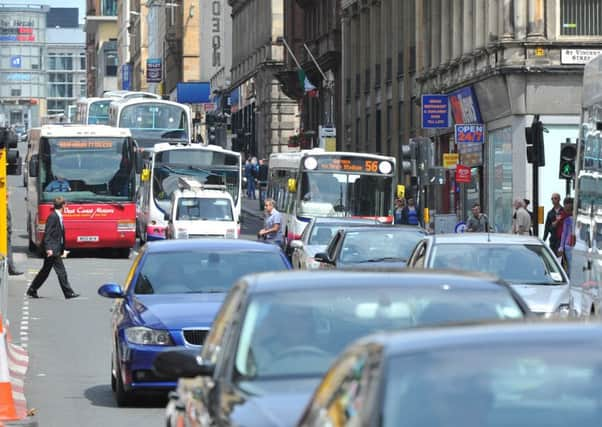Scots cities ‘10 years behind on air quality’


The group said while a legal limit on the amount of nitrogen dioxide should have been met in 2010, most cities - including the capital Edinburgh - would not achieve this standard until 2020.
Scotland’s largest city Glasgow might not meet the target until 2025, it added.
Advertisement
Hide AdAdvertisement
Hide AdIt carried out analysis of figures from the UK Department for Environment, Food and Rural Affairs (Defra), which it said showed streets in Glasgow, Edinburgh, Dundee, Aberdeen, Perth and Linlithgow in West Lothian could all breach the European limit in 2014.
The air in Hope Street in Glasgow had 66 microgrammes of nitrogen dioxide in it per cubic metre, data for January to July showed, above the limit of 40.
Emilia Hanna, air pollution campaigner with Friends of the Earth Scotland, said: “A number of busy streets are recording high levels of pollution and are on track to break legal limits for 2014. It is disappointing to see continued high levels, especially because Scotland and the UK have been called up by European Courts for its slow progress on cleaning up the air.
“The law required Scotland to have clean air by 2010. These delays see the prospect of clean air slipping over the horizon for people living in Scottish towns and cities. It is unbelievable that we will have to wait another six years for clean air in Edinburgh and even worse that we have to wait until 2025 for clean air in Glasgow. These delays mean there is no end in sight for the thousands of Scots who suffer from air pollution.”
She added: “Air pollution aggravates asthma, and can cause heart disease, strokes, and lung cancer. We know that over 2,000 Scots die from the effects of air pollution each year, so these delays in meeting clean air standards mean even more unnecessary death and suffering.
“Scotland is breaking European laws on air pollution. Under EU rules, Europe could eventually impose hefty fines on the UK and Scotland if it fails to clean up its act. The public should not have to cough up the money to pay for the Government’s continued inaction. The public may have to pay out twice for air pollution, once for health care of those affected and then again through EU fines for government’s failure to act.
“The Scottish Government has thus far proved itself unwilling to take the steps necessary to tackle this public health crisis. It has been hoping for improvements in vehicle technology to solve the problem but it should be proactive in cutting traffic levels by halting new unnecessary road developments, investing more in walking and cycling, and improving public transport.
“The health impacts of air pollution are clear, the Government’s strategy is not. For the sake of people’s lives and wellbeing, air pollution needs to be tackled as an urgent priority. We cannot afford to wait any longer.”
Advertisement
Hide AdAdvertisement
Hide AdA Scottish Government spokeswoman said: “These revised projections from Defra are very disappointing as previous projections suggested that all parts of Scotland would comply with legal limits for nitrogen dioxide pollution from traffic within the next couple of years.
“Although the UK, as member state, is ultimately responsible for its failure to comply with the nitrogen dioxide limits in the European air quality directive, Scotland takes our EU obligations very seriously.
“That is why we have been working hard - in close collaboration with local authorities, Transport Scotland, the Scottish Environment Protection Agency, Health Protection Scotland and other partners - to put in place a series of measures which have led to significant improvements in air quality in recent years, and our action plans set out the work being done to meet EU standards in the shortest possible time.”